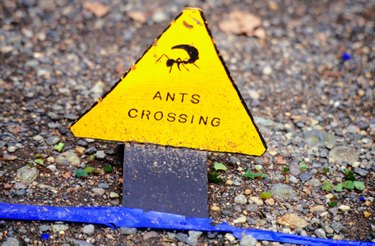
Commercially available products using permethrin as the active ingredient can be purchased as granules, liquid or spray to kill ants indoors and outdoors. While most ants are beneficial in the garden, they can be problematic in the house. However, you may want to try less harmful control methods before using insecticides such as permethrin. Proper identification of ant species will help you implement a constructive control system regardless of the method you choose.
Permethrin for Control
Video of the Day
Before laying out potentially dangerous chemicals such as permethrin, you can try to eradicate your ant problem with a less severe solution. For example, make a moat of soapy water around bowls of pet food to trap and kill ants. If you decide to use permethrin, be sure the product you choose is labeled for use on ants and follow the manufacturer's directions carefully. Be prepared to treat a nest more than once, especially if the nest is in direct sunlight or it has rained recently.
Video of the Day
About Permethrin
Permethrin is a synthetic chemical inspired by the chrysanthemum flower's natural insecticide called pyrethrin. Permethrin can have harmful side effects to the environment and people, including skin irritations. This chemical is also listed by the U.S. Environmental Protection Agency as a possible carcinogen based on animal studies. Keep pets and children away from areas where you use permethrin.
Ants in the House
Ants found in the home live in a variety of places including behind countertops and baseboards. Some ants will eat a variety of kitchen scraps found on the counter or floor. Pharaoh ants will infest food. Put food away and clean up spills immediately to help dissuade indoor ants. Use vinegar and water or a commercially available sticky barrier to temporarily erase the chemical trails that ants leave behind, which will make them look for a new source of food.
Ants in the Yard
Outside ants build nests anywhere including in the lawn or a flower bed. Remove piles of debris to make less attractive nesting areas in the yard. If the ants are herding aphids on plants to collect honeydew, then spray the plant with a blast of water so the aphids drop off and the ants will move elsewhere.
Danger to Other Insects
All chemical insecticides have effects on insects other than ants, so use them with care. Many plants and fruit trees require bees and other pollinating insects to complete their reproduction cycle. If you accidentally kill these insects, your plants will suffer, too.
Ant Benefits
Ants are beneficial insects in your garden. They help control and kill harmful insects and remove insect carcasses. To a small degree, ants can help improve soil conditions with increased aeration while building their nests and tunnels. Ants can also help control weeds by destroying the seeds.
- University of Minnesota Extension; What to Do About Household Ants; Jeffrey Hahn, et al.; 2003
- Washington State University Extension; Carpenter Ants; Sharon J. Collman, et al.; 2010
- Colorado Department of Public Health and Environment: Mosquito Control Insecticides: Permethrin (Pyrethroids)
- Colorado State University Extension; Ants and Landscape Plants; October 2010